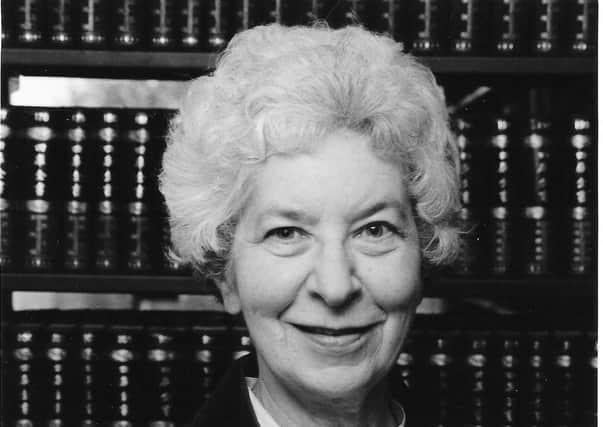Obituary: Cecily Giles CBE, wartime codebreaker and university secretary


Cecily Giles was one of those supremely capable women who seemed to succeed in every area she chose to embrace.
She had been studying history at Edinburgh University when her potential was spotted and she was invited for interview by the Director of Military Intelligence at the War Office. Only later did she find out she had been recommended for Bletchley Park, the wartime HQ of Government Code and Cypher School.
Advertisement
Hide AdAdvertisement
Hide Ad“I had a half blue in lacrosse and had been president of the Dramatic Society so I was an obvious candidate for Intelligence work,” she quipped.
The 21-year-old undergraduate enrolled in the ATS, attached to the Intelligence Corps, and during training was introduced to details of the Enigma machine, the incredibly complex encryption machine used by the German armed forces to send coded messages.
She came out top in the main final test of her six-week specialist course, above many brilliant contemporaries from Oxford and Cambridge. “Naively surprised” by her achievement, she said she just had a good memory.
Miss Giles spent two-and-a-half years at Bletchley where the top secret work of the codebreakers, who cracked the Nazi’s “unbreakable” Enigma, was credited with shortening the Second World War by at least two years. Prime Minister Winston Churchill described the teams as “the goose that laid the golden egg but never cackled” and Miss Giles always respected that silence.
She worked in the ATS Military Section SIXTA, which was responsible for traffic analysis and embodied precisely the type of recruit crucial to Bletchley’s success: intellectually smart; able to work quickly and to handle the stress of concentrating intensely during long shifts. But above all she was discreet. Her work was never discussed in the huts, the mess or on social occasions. She said: “I had signed the Official Secrets Act and I still honour it as regards the work I did, of which I have never seen a published account.”
A few months after the war ended Bletchley moved to Eastcote in London, where it was renamed GCHQ, and Miss Giles moved with it to the related Latimer Camp. “Our teams and work changed. We were joined by weary ex-Desert Rats, wounded naval officers and exhausted RAF pilots, all rather bewildered to be in the charge of an ATS staff sergeant. One said, ‘Shouldn’t you call me Sir?’ ” she recalled. Though she ran the team they were all on Christian name terms.
Cecilia Elspeth Giles, known as Cecily, was born at her grandfather’s house in Dumfries although the family home was in Edinburgh where her father was university reader in Ancient Greek and Roman History. Already able to read when she went to St Andrew’s Cottage School aged four, she continued her education at St Trinnean’s before leaving Edinburgh for Queen Margaret’s, Scarborough, where she was evacuated to Castle Howard in 1940. She maintained links with the school throughout her life and was an honorary vice-president of the Margaretian Association.
At school Miss Giles played leading theatrical roles and at Bletchley performed in drama productions alongside Olivia Newton-John’s father Brin, an MI5 officer who had interviewed Hitler’s deputy, Rudolf Hess, after he parachuted into Eaglesham in 1941.
Advertisement
Hide AdAdvertisement
Hide AdDemobbed in 1946, she returned to Scotland and worked for the National Farmers’ Union and in secretarial duties at Edinburgh University. After visiting her brother Sandy, District Commissioner at Kongwa in Tanganyika, she spent an academic session working in Khartoum University’s registrar’s office. Returning to Scotland, to Edinburgh University’s secretary’s office, she became assistant secretary and began a lifetime of service to the institution.
She reorganised the administration of post-graduate studies, acted as secretary to the Staff Club and to the Principal and Deans’ group, shared in servicing the Senatus Academicus and took a leading part in the training of administrative staff.
Miss Giles was seconded part-time as the Committee of Vice-Chancellors and Principals’ Administrative Officer for all the United Kingdom’s Universities when she rewrote the administrative training handbook.
She also worked with overseas students and student exchanges, was president of the Graduates’ Association and an honorary president from 2004, and served on the Business committee of the General Council, convening its Constitutional sub-committee which produced what is now known as The Giles Report.
In addition she served on the Woman’s Union Committee and helped many student societies, taking part in their debates and other activities.
A loyal Tory, she was convener of the East of Scotland Young Conservatives, chairman of South Edinburgh Conservatives, a long-standing member of the Scottish Conservative and Unionist Association Executive and chairman of the Conservative Party Conference in Scotland.
Appointed a CBE in 1984 for public and political work, Miss Giles was a devoted member and steward of Edinburgh’s St Giles’ Cathedral, served on the General Assembly of the Church of Scotland’s Board of Stewardship and Finance becoming vice-convenor from 1991-93. She also sat on committees of Action of Churches Together in Scotland and on the Transport Users and Rail Users Consultative Committees.
With her sister Margaret, Miss Giles travelled widely – to Japan, America, Canada, Morocco, Paris and Florence, and was among the first tourists to see China. She also continued her love of drama with The Harpic Players and gave many talks and readings, including extracts from Kipling and Saki.
A loving godmother to six, she never married and was predeceased by her brother and sister.
ALISON SHAW
Comments
Want to join the conversation? Please or to comment on this article.